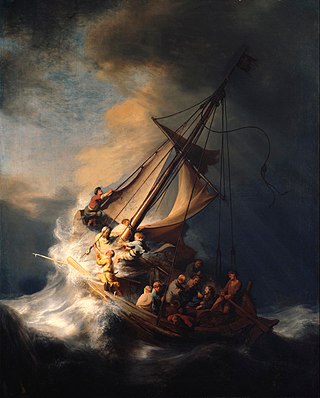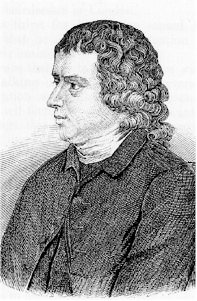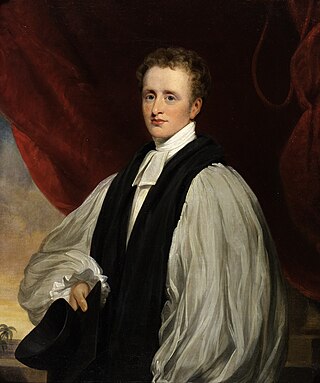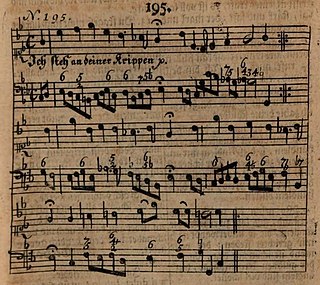
"Love Divine, All Loves Excelling" is a Christian hymn by Charles Wesley on Christian perfection. Judging by general repute, it is among Wesley's finest: "justly famous and beloved, better known than almost any other hymn of Charles Wesley." Judging by its distribution, it is also among his most successful: by the end of the 19th century, it is found in 15 of the 17 hymn books consulted by the authors of Lyric Studies. On a larger scale, it is found almost universally in general collections of the past century, including not only Methodist and Anglican hymn books and commercial and ecumenical collections, but also hymnals published by Reformed, Presbyterian, Baptist, Brethren, Seventh-day Adventist, Lutheran, Congregationalist, Pentecostal, and Roman Catholic traditions, among others including the Churches of Christ. Specifically, it appears in 1,328 of the North American hymnals indexed by the online Dictionary of North American Hymnology, comparable to Newton's "Amazing Grace" (1,036), Wesley's "O for a Thousand Tongues" (1,249), and Watts' "When I Survey the Wondrous Cross" (1,483), though still well short of Toplady's "Rock of Ages" (2,139) or Wesley's own "Jesu, Lover of my Soul" (2,164).

"Be Thou My Vision" is a traditional Christian hymn of Irish origin. The words are based on a Middle Irish poem that has traditionally been attributed to Dallán Forgaill.

"For All the Saints" was written as a processional hymn by William Walsham How, who was ultimately the Anglican Bishop of Wakefield. The hymn was first printed in Hymns for Saints' Days, and Other Hymns, by Earl Nelson, 1864.

"Christ the Lord Is Risen Today" is a Christian hymn associated with Easter. Most of the stanzas were written by Charles Wesley, and the hymn appeared under the title "Hymn for Easter Day" in Hymns and Sacred Poems by Charles and John Wesley in 1739. The hymn eventually became well known for the "Alleluia" sung as a melisma after each line, which was added by an unknown author, probably to fit the commonly used hymn tune, "Easter Hymn". It remains a traditional processional hymn on Easter Sunday.

"Eternal Father, Strong to Save" is a British hymn traditionally associated with seafarers, particularly in the maritime armed services. Written in 1860, its author, William Whiting, was inspired by the dangers of the sea described in Psalm 107. It was popularised by the Royal Navy and the United States Navy in the late 19th century, and variations of it were soon adopted by many branches of the armed services in the United Kingdom and the United States. Services who have adapted the hymn include the Royal Marines, Royal Air Force, the British Army, the United States Coast Guard, United States Marine Corps and the United States Space Force, as well as the navies of many Commonwealth realms. Accordingly, it is known by many names, variously referred to as the Hymn of His Majesty's Armed Forces, the Royal Navy Hymn, the United States Navy Hymn, and sometimes by the last line of its first verse, "For Those in Peril on the Sea". The hymn has a long tradition in civilian maritime contexts as well, being regularly invoked by ship's chaplains and sung during services on ocean crossings.

"Just as I Am" is a well-known hymn, written by Charlotte Elliott in 1835, first appearing in the Christian Remembrancer, of which Elliott became the editor in 1836. The final verse is taken from Elliott's Hours of Sorrow Cheered and Comforted (1836).

"We Gather Together" is a Christian hymn of Dutch origin written in 1597 by Adrianus Valerius as "Wilt heden nu treden" to celebrate the Dutch victory over Spanish forces in the Battle of Turnhout. It was originally set to a Dutch folk tune. In the United States, it is popularly associated with Thanksgiving Day and is often sung at family meals and at religious services on that day.

"O Sacred Head, Now Wounded" is a Christian Passion hymn based on a Latin text written during the Middle Ages. Paul Gerhardt wrote a German version which is known by its incipit, "O Haupt voll Blut und Wunden".

"Come Thou Fount of Every Blessing" is a Christian hymn written by the pastor and hymnodist Robert Robinson, who penned the words in the year 1758 at the age of 22.
"For the Beauty of the Earth" is a Christian hymn by Folliott S. Pierpoint (1835-1917).

"Holy, Holy, Holy! Lord God Almighty!" is a Christian hymn written by the Anglican bishop Reginald Heber (1783–1826).
"How Great Thou Art" is a Christian hymn based on an original Swedish hymn entitled "O Store Gud" written in 1885 by Carl Boberg (1859–1940). The English version of the hymn and its title are a loose translation by the English missionary Stuart K. Hine from 1949. The hymn was popularised by George Beverly Shea and Cliff Barrows during the Billy Graham crusades. It was voted the British public's favourite hymn by BBC's Songs of Praise. "How Great Thou Art" was ranked second on a list of the favourite hymns of all time in a survey by Christianity Today magazine in 2001 and in a country wide poll by Songs Of Praise in 2019.

"Lord of all Hopefulness" is a Christian hymn written by English writer Jan Struther, which was published in the enlarged edition of Songs of Praise in 1931. The hymn is used in liturgy, at weddings and at the beginning of funeral services, and is one of the most popular hymns in the United Kingdom.

"The Hymn of Joy" is a poem written by Henry van Dyke in 1907 with the intention of musically setting it to the famous "Ode to Joy" melody of the final movement of Ludwig van Beethoven's final symphony, Symphony No. 9.
"Come Thou Almighty King" is a Christian hymn of unknown authorship, which is often attributed to Charles Wesley.

"Come, Thou Long Expected Jesus" is a 1744 Advent and Christmas carol common in Protestant hymnals. The text was written by Charles Wesley. It is performed to one of several tunes, including "Stuttgart", "Hyfrydol", and "Cross of Jesus". The hymn is considered an enduring classic in Christian hymnody.
The God of Abraham Praise is a Christian adaptation of the well known Jewish hymn "Yigdal", loosely translated and Christianised by the evangelist Thomas Olivers after a visit to the Great Synagogue of London in 1770. It was first published in 1772. The title of the hymn was based on a verse in the Book of Exodus: "I am the God of thy Father, the God of Abraham".
"Crown Him with Many Crowns" is an 1851 hymn with lyrics written by Matthew Bridges and Godfrey Thring and sung to the tune 'Diademata' by Sir George Job Elvey. The hymn appears in many hymnals.

"Ich steh an deiner Krippen hier" is a German Christmas hymn, with lyrics by Paul Gerhardt which were first published in 1653. It was then sung with an older melody by Martin Luther, but a melody which was likely created by Johann Sebastian Bach for Schemellis Gesangbuch of 1736 is now part of current Protestant and Catholic hymnals.

"Sun of Unclouded Righteousness" is a little-known 1758 Christian hymn written by Charles Wesley, the brother of John Wesley, the founder of Methodism. It was written as an intercessory hymn praying for the salvation of Muslims and calls for their conversion to Christianity. It had fallen out of use by around 1880.














